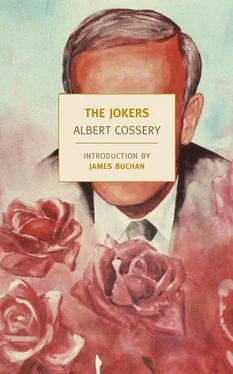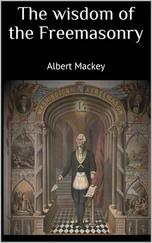Soad looked at him with enormous eyes; she was expecting a triumphant outburst. She couldn’t understand his silence.
“Why don’t you say something?”
“Well, that’s an exceptional piece of news. I’m sorry. You deserve a reward.”
He reached across the table, took her hand, and gave it a polite kiss. That was when he saw the giant topaz ring on her finger — an extraordinary jewel that leaped out at him like a flash of light in darkness. But he betrayed no surprise as he set the young woman’s hand down on the table. The ring was like a living thing, and Soad gazed at it with hideous delight. Without turning her head from the brilliant stone she murmured:
“Aren’t you surprised to see me with this ring?”
“Why surprised?”
“Oh, I know! Nothing surprises you! You don’t care about me. But I’m so unhappy!”
“Unhappy? With all that jewelry?”
“I haven’t told you everything. In this thing with the governor — I’m the real victim.”
“What do you mean?”
“Well, my father acted suspicious about that check. He must have inquired about it at the newspaper you sent it to. He didn’t say anything to me about it, not explicitly at least, but he keeps going on about how badly I’ve treated him.”
“And that’s why you’re unhappy?”
“No, but now he wants to get rid of me. He demands that I get married. Now that’s a terrible punishment, you have to agree.”
“But what does the jewelry have to do with it?”
“Well, I didn’t compromise. I told him I didn’t want to get married. He started off by threatening terrible things, and then to bring me around, he gave me all the jewelry that after my mother died had been locked away to give to me when I was older. But it was time, he’d decided, for me to look like a marriageable woman; he wants his future son-in-law to appreciate the fortune that I’ll bring.”
“He’s quite right. He understands the kind of man he’s dealing with. You should rest easy: you’ll find a husband before you know it.”
“So you aren’t sorry for me?”
“Don’t play the victim. You’re perfectly happy to get married.”
“What choice do I have, since you don’t want me?”
“I don’t like jewelry,” said Heykal, in a cutting voice.
And so the idyll had reached its end — the most ridiculous end imaginable. Heykal hadn’t had any expectations, and he felt no disappointment. Everything was falling into place. A few jewels, and the love-struck little girl was gone, leaving nothing but a woman with an attachment to comfort and money, to the security that comes from material possessions. All of a sudden she’d given up doing things for fun and had gone back to her rotten world. The truth was, her only way forward was through trickery. Trickery was her element; she’d been born to it. And that was how she would succeed in employing her talents, assuaging her thirst for possessions, and triumphing again and again over men.
Heykal would have liked to shed a few tears for this girl whom he’d been so close to and who was now about to disappear from his life, but his eyes remained dry. The pain was good, almost like joy. He felt that he’d been reborn, free and clear, with all his restored richness intact. He looked over at the other little girl — the one who still hated her mother — searching her face for a trace of that innocent spontaneity that had been taken from him. She’d finished her ice cream and was sitting with her elbows on the table, one hand under her cheek, a brooding expression on her face. Heykal thought she was sulking, and he smiled at the thought that already she was jealous.
“But how can I?” whimpered Soad. “How can I even talk to another man, now that I’ve known you! I mean, not only because I love you but because I’ll be bored to death. You’re the only man who doesn’t disgust me!”
He knew that it wasn’t true, that she’d adapt easily to the ugly world she was returning to. The ugliness wouldn’t even offend her as it would be hidden under brilliant costumes and masks. Soon all of the people trailing along behind her would seem charming to her; she’d never see the horror behind the smiling faces that her beauty had conquered. Heykal knew all about the puerile vanity of women who’re only bored when the adoration stops. Soad was too beautiful to ever be bored.
What was the point of disabusing her? She’d played her part willingly and well. And the passion with which she had offered up to him the treasures of her young body was also worthy of esteem. He should be indulgent of her incoherence and her fears; he wasn’t an ingrate. She still deserved a touch of tenderness.
“I taught you how to find joy everywhere,” he said. “So don’t worry; you won’t be bored.”
“Will you think of me?” she asked. Then, worried: “But not in your mocking way! I know you!”
“I will think of you entirely seriously. I promise.”
They were silent for a moment, then Soad opened her bag and began to reapply her lipstick. Heykal was struck by the look of contentment with which she completed the task. He’d never seen her do it before, making that thoroughly obscene gesture of stroking a red wand over her parted lips. She seemed proud of the act, as if it made her a woman. Disgust and a hint of bitterness seized him at the sight of this sacrilegious daubing: it disfigured the image he wished to preserve of the girl. He turned away, waiting for the barbaric work to be done.
When she was finally ready, he stood. They left the tearoom and said their goodbyes in the street.
As for Heykal, he trembled with his new freedom, already alert to the promises that lay strewn in his path. Other faces, other passions awaited, and he contemplated the end of his love with a voluptuous serenity. It was always like this. He would feel a strange happiness, as if the woman he’d abandoned had left with a portion of his love, so that a part of him would always be out there roaming the vast universe.
The busy, crowded street reminded him that as yet nobody knew about the important event — the governor’s resignation — that would soon take place. Heykal suddenly was filled with delight: he had to tell his friends right away. He picked up his pace, looking to see if he could find the jasmine seller who was usually somewhere around here. At last he saw him, standing by a door, unshaven, a sinister figure in spite of the red flower tucked behind his ear to signal his profession. Heykal bought a slender bouquet of jasmine, slipping it delicately into the inside pocket of his jacket. Then he hailed a horse-drawn coach and yelled Urfy’s address to the driver.
Seated at his desk in the empty classroom, Urfy was concentrating with difficulty on the book he was reading. The late-afternoon light still penetrated the basement windows, but it was the stingy, dirty light of a dungeon. Urfy abandoned his reading, removed his glasses, and rubbed his eyes irritably. The thoughts rattling around in his head filled him with bitterness. It was his mother, as always, who was worrying him; he dreaded the decision he had to make. One of his friends, a doctor, had strongly advised him to put the old woman in a clinic where she would receive state-of-the-art care. There was a slim chance that her condition might improve — but was a slim chance worth the anguish of separation? The clinic was fairly distant from the city, and he would be able to visit her only rarely. It was a proposal that Urfy stubbornly rejected. Transferring his mother into the care of strangers would feel like abandonment. Little by little, she’d start to forget him: his image would vanish into the folds of her wavering memory and in the end he would be extinct in her heart. And this flame that still burned in his mother’s spirit, the last trace of the happiness of his childhood, was his only safeguard against an atrocious world. He suppressed the tears that were rising to his eyes and put his glasses back on. When he was ready to start reading again, he realized that the light had disappeared and he could no longer see a thing.
Читать дальше












